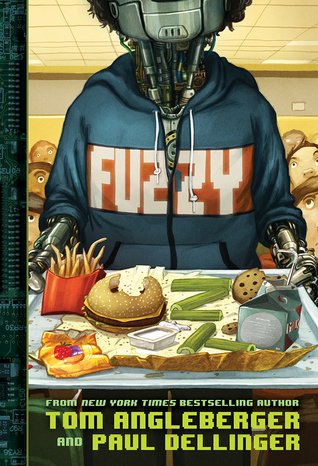
Oh, wow! If you enjoyed the humor and school setting of Tom Angleberger's Origami Yoda series, then you must read his new book with coauthor Paul Dellinger. Max (short for Maxine, but she just likes Max and that's all) is a student at Vanguard Middle School. The school has been selected to pilot a Robot Integration Program, having an actual robot as a student. When she is chosen to act as a native guide for the robotic student, Fuzzy, Max is thrilled. But not everyone is happy about this development, including the computer program Barbara that acts as the vice-principal for the school. Barbara's lines of code and logic see Fuzzy as a disruption to learning, and students like Max fall into the same category. To get rid of these distractions, how far can and will a computerized school principal go?
As a teacher during a time of high-stakes testing and constant pressure from government at all levels to "improve student performance," I had to laugh at the #CUG in the story. The Federal School Board has come up with a program called Constant UpGrade (Get it - Up Grade?) that all the schools must follow. The computer program Barbara is there to help with that goal. Her job is supposed to be keeping track of demerits for breaking school rules, logging test scores, etc. And the students all feel pretty much the same about it. "The Constant UpGrade program was supposed to be a "revolution in education" with "cutting-edge technology" like Barbara. But it had turned out to mostly be a giant pain in the butt. The cutting-edge technology was always yelling at you, and with the constant testing, none of the classes were any fun. Since teachers got their own #CUG scores, all they seemed to care about was preparing for the next test." I just have to ask - how much time have the authors spent on school visits lately? Because we may not have computers for vice-principals, but some of what they describe in this fictional school feels all too real. And the rest feels like a dire prediction of things to come.
Anyway, I digress. My point is that just as Fuzzy's programmers put him into the school environment to try and help him learn to emulate human behavior, the authors have managed to capture middle school life very well. The pressure to do well because your academic future depends on it (with or without #CUG). The helpless feeling of being a teen or tween and having multiple adults all telling you what to do - sometimes with conflicting orders. The struggle to find a way to fit in and have friends. And that last one is something that Fuzzy really seems to be writing a lot of code for as he comes up with improvements on his programming and evolves as a thinking machine. The references to classic SciFi like Isaac Asimov, Arthur C. Clarke, and Ray Bradbury are awesome and will perhaps send young readers looking for some of that great literature.
Anyone who wants to see school improvement taken to a laughable extreme, who enjoys some SciFi or tech mixed in with their stories of friendship and school hi-jinx, or who is simply waiting for the next Angleberger book - please readFuzzy. You will love it (98.66% chance of success).
I read an e-book provided by the publisher through NetGalley.
For more information about Tom Angleberger, visit his website.
No comments:
Post a Comment